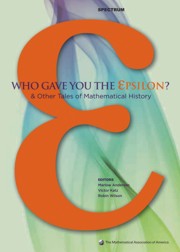Book contents
- Frontmatter
- Introduction
- Contents
- Analysis
- Foreword
- Who Gave You the Epsilon? Cauchy and the Origins of Rigorous Calculus
- Evolution of the Function Concept: A Brief Survey
- S. Kovalevsky: A Mathematical Lesson
- Highlights in the History of Spectral Theory
- Alan Turing and the Central Limit Theorem
- Why did George Green Write his Essay of 1828 on Electricity and Magnetism?
- Connectivity and Smoke-Rings: Green's Second Identity in its First Fifty Years
- The History of Stokes' Theorem
- The Mathematical Collaboration of M. L. Cartwright and J. E. Littlewood
- Dr. David Harold Blackwell, African American Pioneer
- Afterword
- Geometry, Topology and Foundations
- Algebra and Number Theory
- Surveys
- Index
- About the Editors
S. Kovalevsky: A Mathematical Lesson
from Analysis
- Frontmatter
- Introduction
- Contents
- Analysis
- Foreword
- Who Gave You the Epsilon? Cauchy and the Origins of Rigorous Calculus
- Evolution of the Function Concept: A Brief Survey
- S. Kovalevsky: A Mathematical Lesson
- Highlights in the History of Spectral Theory
- Alan Turing and the Central Limit Theorem
- Why did George Green Write his Essay of 1828 on Electricity and Magnetism?
- Connectivity and Smoke-Rings: Green's Second Identity in its First Fifty Years
- The History of Stokes' Theorem
- The Mathematical Collaboration of M. L. Cartwright and J. E. Littlewood
- Dr. David Harold Blackwell, African American Pioneer
- Afterword
- Geometry, Topology and Foundations
- Algebra and Number Theory
- Surveys
- Index
- About the Editors
Summary
Sofya Kovalevsky was a noted writer whose works include both fiction and non-fiction. She was also a political activist and a public advocate of feminism. In addition, she was a brilliant mathematician who made significant contributions despite the enormous educational and political obstacles that she had to over-come. Somehow her many achievements have been forgotten. In those few instances where her work has not been lost it has been denigrated by such studies as Felix Klein's history of nineteenth-century mathematics. Klein dismisses Kovalevsky's work in the following manner ([3], p. 294): “Her works are done in the style of Weierstrass and so one doesn't know how much of her own ideas are in them.” He finds something wrong with all her research and credits her with only one positive accomplishment, drawing Weierstrass out of his shell through their correspondence. It is time to set this record straight and to let the facts speak for themselves. (Although Kovalevskaya, the feminine version of the name Kovalevsky, is used in much of the current literature, the author will refer to Kovalevsky in this paper, as that was the name under which Sofya Kovalevsky worked and published. However, in the references the author has used the version of the name that appeared in the work cited.)
Sofya Krukovsky, known affectionately as Sonya, was born in Moscow in 1850. Her father, a Russian army officer, retired in 1858 and moved the family—Sofya, her older sister, Anyuta, and her younger brother, Fedya—to Palibino, an estate near the Lithuanian border.
- Type
- Chapter
- Information
- Who Gave You the Epsilon?And Other Tales of Mathematical History, pp. 27 - 35Publisher: Mathematical Association of AmericaPrint publication year: 2009

